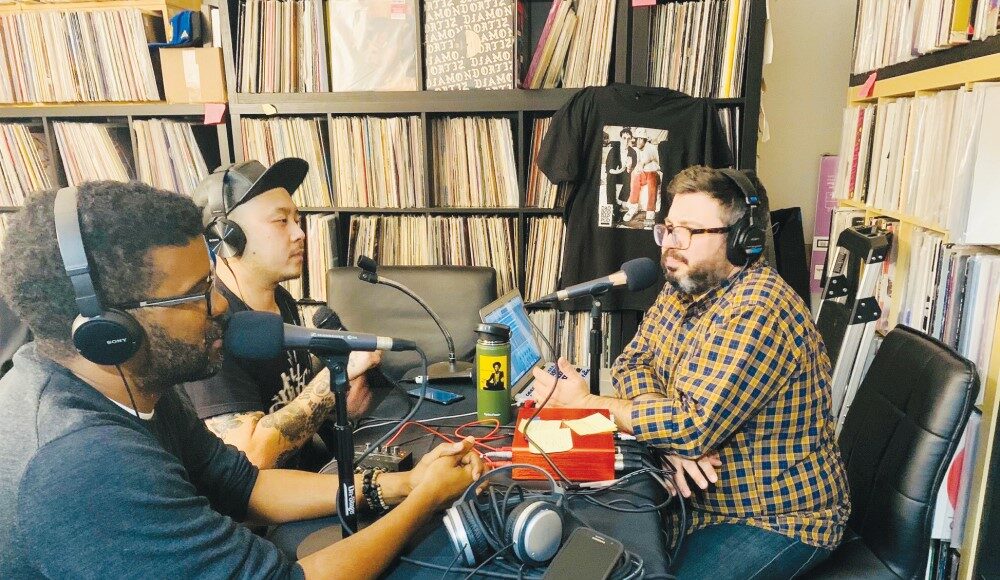Episode 91 of Dad Bod Rap Pod, opens with co-host Demone Carter lamenting the state of rap-oriented academia. “I like legit hip-hop books,” he tells his fellow podcasting crew—David Ma and Nate LeBlanc. “There’s a lot of shitty ones.”
Carter continues the banter with an anecdote about the kinds of rap biographies typically found in the young adult section of the public library, where he recently discovered a very short book on Kendrick Lamar.
“It’s the type of book you would read in fourth grade because you had to do a fuckin’ book report,” he quips.
For their part, Ma and LeBlanc, agree. All three are dyed-in-the-wool hip-hop heads who would like to see rap music treated with the respect it deserves. Depending on who you ask, the genre is somewhere between 40 and 50 years old. And given that hip-hop has been a mainstream musical force since at least the late ’70s, there are now three generations of demographically distinct Americans—Gen X-ers, Millennials and Gen Z-ers—who grew up or are now coming of age listening to commercial rap.
“In the music section of any bookstore, there are hundreds of books on rock & roll. … There are like 50 books on John Coltrane,” Ma says. “Scholarly attention to the history of hip-hop is long overdue.”
While there certainly have been serious studies of hip-hop, including author Jeff Chang’s Can’t Stop, Won’t Stop and We Gon’ Be Alright, the Dad Bod Rap Pod is at the vanguard of brainy podcasts focused on the genre.
As it turns out, on this particular episode, Carter is winding up to introduce the author of a forthcoming deep dive into an under-documented chapter of hip-hop history.
Goin’ Off: The Story of the Juice Crew and Cold Chillin’ Records, is by author Ben Merlis, the guest of DBRP episode 91. Featuring a forward by the San Jose-bred DJ and boutique record label owner Peanut Butter Wolf, Goin’ Off will be released later this month as part of the RPM series on historically important independent music labels, published by German record company BMI.
Hip-hop scholars and journalists are common guests on the podcast, which Carter, Ma and LeBlanc have been recording for about two years now. Two weeks ago, on Episode 90, the crew interviewed Shawn Setaro, a senior staff writer for Complex, who has recently been covering the trial of one of hip-hop’s most divisive figures, Tekashi 69.
Ma also uses his connections as a music journalist to secure emcees and DJs. Kool Keith, Del the Funkee Homosapien, Open Mike Eagle and Ant (from Atmosphere) have all been guests on the show.
The podcast grew organically out of conversations the three would have on a regular basis over beers. “We have these sort of nerdy conversations anyways,” Ma says, explaining the show’s inception. “We thought we might as well record.”
As a music writer, Ma’s insights are rounded out by those of Carter—a local rapper who goes by the name Dem One—and LeBlanc, a longtime record collector. Ma and LeBlanc have a history of working together as DJs on the local club circuit; they also co-founded Needle to the Groove Records, the independent record label that they run out of the Needle to the Groove record shop in San Jose (the shop has a separate ownership group). Dad Bod Rap Pod is taped at the shop’s adjacent recording studio.
Moving forward, Ma says he and his collaborators look forward to growing the podcast, which already enjoys a global following and is nearing a milestone—its 100th weekly episode.
In the process, Ma hopes his podcast will further legitimize the academic study of hip-hop music and culture. It only makes sense. Although it took a while for critics to take jazz and rock & roll seriously, eventually fans of every genre grow up and take control of the levers of society.
“We’re at a point where there is dad rap,” Ma says.
Dad Bod Rap Pod
Thursdays



